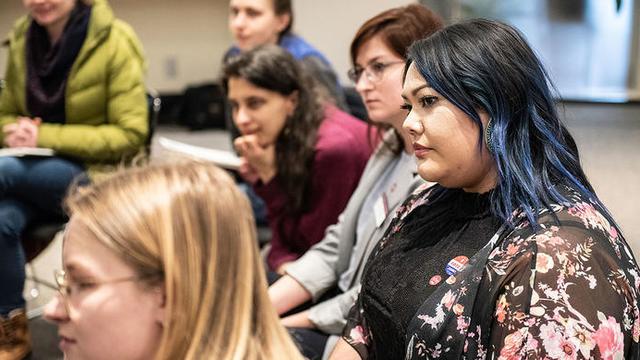Photo: Bruce Silcox
By Nina Domingo and Meredith Song
Nina Domingo and Meredith Song, both University of Minnesota students, helped plan the 2020 International Women's Day event, "From Seeds to Movements: Feminist Leadership in Climate Justice," co-hosted by the Humphrey School of Public Affairs and the Center on Women, Gender, and Public Policy. They share their reflections on the event.
Twenty-five years after the last World Conference on Women featuring goals related to women and the environment, The Humphrey School commemorated International Women’s Day March 3 with a densely packed event focused on feminist leadership in climate justice movements.
Much like a garden or prairie, the event began with a seed. As members of the student-led planning committee, we decided to build the event around a metaphor of movement: “seeds,” which are cultivated and stewarded by women and feminists through tending to the soil (resources) and acts of watering (direct action), light (sharing and exposure), and weeding (rest and accountability).
The seed metaphor guided the conversations that took place among students, faculty, community members, and leaders during the small-group and plenary sessions.
Guiding those conversations were 10 feminist leaders who have long been on the front lines of environmental and climate justice activism. They are engaged with various aspects of climate justice via youth movements, food justice, land and water sovereignty, arts, health and safety, and academic research. Through the discussions they led, participants witnessed how deeply interconnected different movements within the climate space are.
Mysti Babineau, indigenous organizer with MN350, reflected that climate justice should simply be called justice, because climate justice cannot exist without justice in all other aspects of our world.
Michelle Garvey, environmental justice activist and educator, shared how her breakout session interpreted the climate movement as feminist because it reaffirms the importance of the nurturing behavior traditionally associated with women, and highlights the need to extend that behavior towards the rest of the planet.
Bonnie Keeler, water management policy researcher and faculty member at the Humphrey School, added nuance to the conversation by discussing how climate activism can also add additional burdens and responsibilities to women who are already performing so much unpaid labor.
Speaking on youth movements, Juwaria Jama, a 16-year-old climate activist, said it shouldn’t be the responsibility of children to educate our public officials on climate and social issues. Taysha Martineau of the Gitchigumi Scouts emphasized her commitment to creating a better world for her children in the fight against the Line 3 pipeline, and in the search for missing and murdered indigenous women and relatives.
Theater artist Elle Thoni shared her mother's story during several powerful moments in the program, reminding us that we are all artists and creators. Humphrey School disaster planning scholar Fayola Jacobs shared her reflections on finding home; Karen Clark and Ashley O’Neill Prado contributed insights from their experiences in food justice organizing; and Babineau encouraged us all to return to our roots in the land and water that have cared for us for millennia.
As facilitators of the plenary session, we both felt incredibly grateful to have shared space and time with these amazing leaders. Though the reality of the climate crisis can seem bleak at times, the event left us feeling hopeful by celebrating the abundant harvest growing from this brilliant and biodiverse ecosystem of local climate movement seeds.
Nina Domingo is a graduate student in the Bioproducts and Biosystems Engineering Department, interested in conducting research at the intersection of food, the environment, and human health. Meredith Song is an undergraduate student in Genetics and Gender, Women, and Sexuality Studies, with passions for food justice and sustainable agriculture.


